2016/09 New Microsoft 70-532 Exam Questions Updated Today!
InstanT Free Download 70-532 Exam Dumps(PDF & VCE)105Q&As from Braindump2go.com Today!
100% Real Exam Questions! and 100% Exam Pass Guaranteed!
Mix Questions:
1.|2016/09 New 70-532 Exam Dumps(PDF & VCE)105Q&As Download:
http://www.braindump2go.com/70-532.html
2.|2016/09 New 70-532 Exam Questions & Answers:
QUESTION 62
Hotspot Question
You have a cloud service that runs an external process that is named MyStartupTask.cmd.
The cloud service runs this external process when the web role starts.
The external process writes information to the Windows registry.
You set the value of an environment variable named MyID to the deployment ID for the current web role instance.
The external process must complete writing the information to the Windows registry before the web role starts to accept web traffic.
You need to configure the cloud service.
How should you complete the relevant markup? To answer, select the appropriate option or options in the answer area.
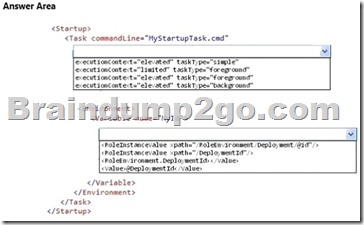
Answer:
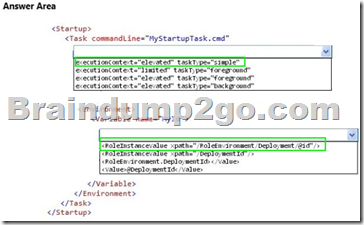
QUESTION 63
Drag and Drop Question
You deploy an application as a cloud service to Azure.
The application contains a web role to convert temperatures between Celsius and Fahrenheit.
The application does not correctly convert temperatures.
You must use Microsoft Visual Studio to determine why the application does not correctly convert temperatures.
You need to debug the source code in Azure.
Which three actions should you perform in sequence? To answer, move the appropriate actions from the list of actions to the answer area and arrange them in the correct order.
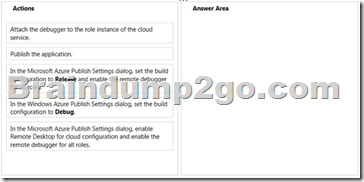
Answer:
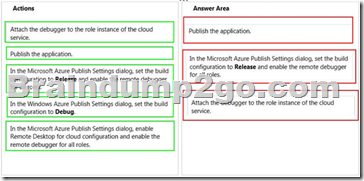
QUESTION 64
Drag and Drop Question
Your team uses a proprietary source control product.
You use FTP to manually deploy an Azure website.
You must move your source code from the proprietary source control product to a secure on-premises Git versioning system. Instead of deploying the website by using FTP.the website must automatically deploy to Azure each time developers check-in source files.
You need to implement the new deployment strategy.
Which three actions should you perform in sequence? To answer, move the appropriate actions from the list of actions to the answer area and arrange them in the correct order.

Answer:
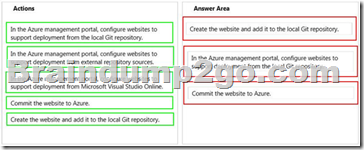
QUESTION 65
You create a software-as-a-service (SaaS) application.
Websites, cloud services, and virtual machines (VMs) read common data values from the database for the application.
The application does not scale efficiently.
All VMs, websites, and cloud services must read from the same data source.
You need to design a cache solution for the SaaS application.
What should you do?
A. Deploy a cache by using Azure Redis Cache.
Access the cache from the websites, cloud services, and VMs.
B. Configure a cache by using ASP.NET.
Access the cache from the websites, cloud services, and VMs.
C. Use Azure Redis Cache to deploy one cache for each website, one cache for each cloud service, and one cache for each VM.
Configure each cache to ensure that data is consistent in all the cache instances.
D. Deploy a cache by using Azure Redis Cache.
Configure the cache to use database connection strings.
Answer: A
QUESTION 66
You are designing an upgrade strategy for a Windows Azure application that includes one web role with one instance.
You have the following requirements:
– Test the application on the Windows Azure platform.
– Ensure that application upgrades can be rolled back.
– Ensure that upgrade and rollback processes do not cause downtime.
You need to recommend an approach for upgrading the application.
What should you recommend?
A. Deploy to the Production slot.
Test the application, and then perform a VIP swap.
B. Deploy to the Staging slot.
Test the application, and then perform a VIP swap.
C. Deploy to the Staging slot.
Test the application, and then perform a manual in-place upgrade to the Production slot.
D. Deploy to the Staging slot.
Test the application, and then perform an automatic in-place upgrade to the Production slot.
Answer: B
Explanation:
Run Set-AzureDeploymentSlot from the service directory to set the deployment environment for the current service to either Staging or Production.
This updates the DeploymentSettings.json file for the service.
A hosted service is a service that runs your code in the Windows Azure environment.
It has two separate deployment slots: staging and production. The staging deployment slot allows you to test your service in the Windows Azure environment before you deploy it to production.
You can upgrade your service by deploying a new package to the staging environment and then swapping the staging and production deployments. This type of upgrade is called a Virtual IP or VIP swap, as it swaps the addresses of the two deployments.
Both deployments remain online during the swap process.
You can swap VIPs using the Windows Azure Platform Management Portal, or by using the Service Management API.
If you are upgrading your service with a new service definition file, you must swap VIPs; you cannot perform an in-place upgrade. However, you can swap VIPs only if the number of endpoints specified by the service definition is identical for both deployments.
For example, if you add an HTTPS endpoint to a web role that previously exposed only an HTTP endpoint, you cannot upgrade your service using a VIP swap; you’ll need to delete your production deployment and redeploy instead
!!!RECOMMEND!!!
1.Braindump2go |2016/09 New 70-532 Exam Dumps(PDF & VCE) 105Q&As Download:
http://www.braindump2go.com/70-532.html
2.Braindump2go |2016/09 New 70-532 Exam Questions & Answers:
https://drive.google.com/folderview?id=0B75b5xYLjSSNfjNlTVBrTzd6YmtmOVQ3aHZDYnpNNzAzZTJqLWVLU3JqWDJPSzR4b1hkd2M&usp=sharing